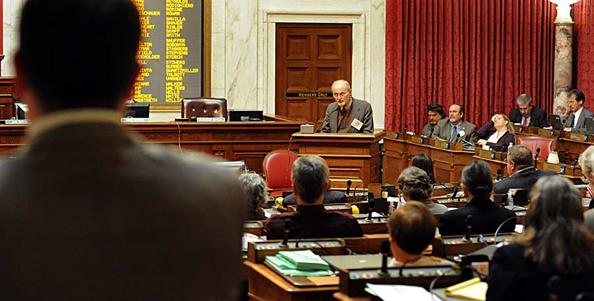|
This article originally provided by The Charleston Gazette February 17, 2011 Fears voiced at Marcellus Shale hearing Several worry about lack of regulation; supporters tout economic benefits
CHARLESTON, W.Va. -- Joe Miller's family has owned a tree farm in Preston County for 150 years. But he's worried about what might happen to his business if drilling for natural gas in the state's Marcellus Shale formation isn't controlled. "There is a total lack of regulation and oversight. I am afraid I will have no ability to control what happens on our land," Miller said during a Thursday public hearing in the House of Delegates chamber. But supporters of drilling encouraged lawmakers not to restrict companies too much when it comes to tapping into the vast natural gas reserves, which lie under much of the state. "Last year, our industry paid $200 million in state taxes and created 35,000 high-paying jobs. Marcellus Shale drilling will create 7,000 new jobs and provide $300 million in salaries," said Mike McCown, president of the Independent Oil and Gas Association of West Virginia. But questions remain about how much of that money would reach the people in the communities affected by drilling, one speaker said. "Today, 10 counties in the state generate 62 percent of the gas we produce. They have a higher rate of poverty than the other [45] counties," said Sean O'Leary, from the West Virginia Center on Budget and Policy. Each person was allowed to speak for two minutes at Thursday's hearing. Most of the speakers urged legislators to put some restrictions on developers. John Smisson, an outdoorsman and Sierra Club member, said, "I am concerned about the amount of water used in the process, and the way it is recovered. It is necessary to treat water used in fracking." Fracking, or hydraulic fracturing of underground rocks, is a process used to release natural gas reserves. Many critics fear that the millions of gallons of chemically treated water needed to develop each well, typically between 5,000 and 9,000 feet below the surface, will pollute streams and groundwater. Gary Zuckett, executive director of the West Virginia Citizen Action Group, called Marcellus Shale drilling plans "another brewing disaster linked to our unending appetite for energy. "The [West Virginia] Department of Environmental Protection cannot effectively deal with it. They do not have enough inspectors or money. And they don't have enough regulations," Zuckett said. Marilyn McGeorge, from the League of Women Voters, said, "The League supports a strong regulatory plan. Today, there are only 17 field inspectors to cover new drilling sites, in addition to 157,000 sites already operating. And there will be six million gallons of water used in each well." Drilling supporters like Greg Kozera, an engineer who works for Superior Well Services based in Elkview, said, "We need to make a decision that doesn't restrict development. We need to develop gas reserves to free ourselves from foreign oil." Scott Rotruck, vice president of Chesapeake Energy, said drilling for Marcellus Shale reserves offers "a tremendous economic opportunity for the state. It will also help national security." Rotruck said a number of other useful gases and chemicals, including ethylene and polyethylene, can also be recovered from the natural gas. He and several other speakers also touched on the issue of pooling, which would allow gas-drilling companies the ability to extract gas under large areas of land, even without permission from every property owner. "We need pooling. And everybody will get paid [for their reserves]," Rotruck said. But Bob Hart, from the National Association of Oil and Gas Royalty owners, said, "I am not against pooling. But I am against forced pooling.... We need more study to get this right." Still, the state's regulation of Marcellus Shale drillers -- or the lack of it -- dominated the discussion Thursday. "The time has come," said Howard Swint, a commercial property broker in Charleston, "when we should no longer take industry's word about what they will do with our land and resources." Reach Paul J. Nyden at pjny...@wvgazette.com or 304-3348-5164.
|
|
|
West Virginia Surface Owners' Rights Organization |
